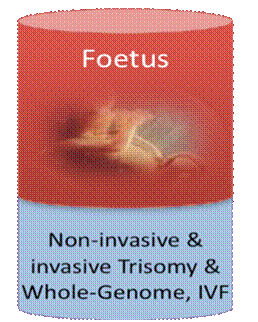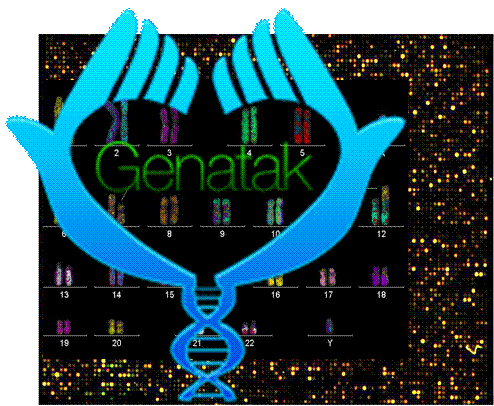

For physicians
Being part of the Global genetic network gives us exclusive ability to offer any genetic test you want to be done on your patients. We have also exceptional strength in utilizing exome sequencing and microarray platforms to detect genetic defects in almost any of the 25,000 human genes. So doctors do not need to guess which gene may be causing the disease anymore.
Genatak is highly specialized in offering you and your patients integrated genetic tests for understanding your patients' risk of developing a certain disease later in life and for accurate diagnosis of an existing or suspected disorder


Pediatricians, Neonatologists and Obstetricians
2000 Genes
We offer you all genetic tests possible. This is achieved by being a part of a world-wide network of laboratories that are specialized, each in a specific gene test. If you know the gene causing the disease then we can sequence it for you using Sanger method. If you do not know the gene, or the syndrome appears strange then we can sequence the whole exome (all gene) of the baby, mother and father (trio) to identify the genetic defect. Exome sequencing is our strength and we are proud to offer this important addition to Kuwait.
Developmental delay and ADHD
Genatak has an exclusive strategic partnership with to develop genetic laboratories in Asia and the Middle East utilizing aCGH platforms, Exome and whole genome Sequencing.
Taking the uncertainty out of diagnosis for genetic disorders will allow you to focus on early intervention. Moreover, our strong partnership with Gendia gives us access to more than 100 certified laboratories in the West so that you will be confident that the tests you order for your patients pass through meticulous quality assurance protocols.
Research reported by the U.S. Centers for Disease Control & Prevention in May 2011, states that one in 6 children are born with some form of developmental disability such as autism, learning disorders or ADHD.
Early and accurate detection of these disorders can help medical professionals direct their attention to constructive intervention with appropriate treatment and management protocols.
Now, through Genatak, doctors can access the most accurate and reliable genetic tests. Using the latest microarray Comparative Genomics Hybridisation (aCGH) platform and Exome /whole genome sequencing, clinicians are now able to make diagnosis with greater accuracy and sensitivity over a broader spectrum of diseases. This allows for a precise and objective diagnosis of genetic disorders at the earliest stage, even before any symptoms have manifested.
This particular microarray platform was examined together with other microarrays by leading medical institutions and was the only one selected for diagnostics, based on its most accurate, sensitive and reproducible results. It is now the first-tier diagnostic choice for 27 leading institutions around the world, including the National Health Service in the UK, Harvard Medical School, Emory Genetics and Sick Kids’ Hospital in Toronto.
For prenatal genetic tests, we offer:
Sequenom’s MaterniT21 Plus Non-invasive prenatal Down’s Syndrome , Trisomy Ch 13, and Ch 18 Tests. Now we can detect these fetal chromosomes from the mother's blood sample so that you can avoid Chorionic villous sampling, which is associated with risk of abortion.


Cardiologists
Heart and Stroke Disease Risk Test
A new genetic test that assesses your risk of heart disease and heart attack. The test is based on research carried out in the USA and Canada that made world headlines in 2011.
One of the major findings of that study was that if you have one or more of the high-risk markers, your risk of a heart attack increases by up to 200%.
However, we discovered that we can reduce your risk back to NORMAL, even if you HAVE the marker.
Physicians and general practitioners
The way medicine is practiced nowadays is largely based on trial and error. After taking a good history and ordering the relevant tests, the diagnosis in most cases remain unknown or hard to decipher. Imagine an affordable tool by which you can examine 1631 protein products from the patient's plasma that some may have changed because of inflammation somewhere, reaction to infections, immune system imbalances or other diseases. Now, using our patented full protein microarray, Genatak brings you such a valuable diagnostic tool that will give you an edge over other practitioners and one that can help you diagnose more accurately and professionally.
Taking the "Guess" factor out of medical practice.

Cancer risk prevention and diagnosis
Exome, Array and Single-gene Cancer Diagnostics
Every cancer patient is different and we are at the forefront of this by developing new mutation detection technologies we can tailor therapy to suit you. Not all people with breast cancer, for example, should be treated with chemotherapy. Our technology will help select women who do not to be treated beyond surgery.
“The incorporation of whole-genome and whole-exome sequencing into clinical practice will undoubtedly change the way genetic counselors and other clinicians approach genetic testing. Enabling the analysis of essentially all human genes in one comprehensive test, this new technology can result in reduced testing cost and time to diagnosis (O’Daniel et al, Cancer J. 2012 Jul;18(4).”
Genatak in association with Sengenics and Gendia have developed a comprehensive range of cancer tests based on cutting-edge genomics and proteomics technologies. We offer the following services for cancer diagnostics and prognosis:
- BRCA1 and BRCA2 sequencing
- Breast cancer risk assessment and prevention based on advanced algorithms developed by Genatak highly trained staff
- Her2 gene amplifications in breast and gastric cancers using Fluorescent in situ hybridization and treating them using Herceptin (Trastuzumab)
- EGFR mutations and lung cancer
- BRAF and Ki-Ras mutation in colorectal cancer
- Whole-genome cancer sequencing – including detailed bioinformatics and clinical reporting
- Whole-exome cancer sequencing - including detailed bioinformatics and clinical reporting
- Whole-genome array based cancer analysis to understand the gene-copy number changes
- Haematological cancers - detection of copy number changes and loss of heterozygosity on a single array for the haematological malignancies Chronic Lymphocytic Leukaemia (CLL), Multiple Myeloma (MM), Myeloproliferative Neoplasms (MPN) and Myelodysplastic Syndromes (MDS)